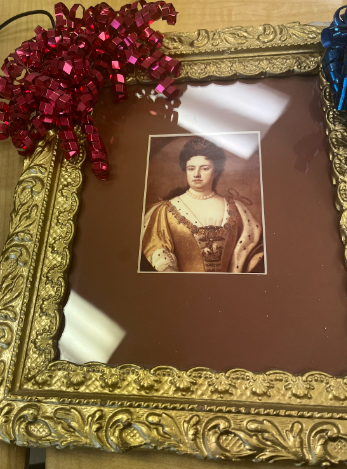Legacy of Princess Anne

March 3, 2023
As the oldest remaining high school in Virginia Beach, PA has a fascinating history particularly exemplified by the name of the school. Most students may be unaware that the school was actually named after the first queen of Great Britain, Queen Anne, who was titled Princess Anne at the time of the now-extinct Princess Anne county’s founding. Though not as famous or well-known as other British queens, her reign was marked by the union of Scotland and England, her controversial relationships with her female companions, and the emergence of a political sphere dominated by two parties. She has only recently become a figure of interest to the public, spurred by the critically acclaimed film The Favourite, starring Emma Stone, Olivia Colman, and Rachel Weisz.
The second daughter of King James II, the younger brother of King Charles II, Anne spent the younger years of her childhood with her grandmother in Paris due to an eye condition that caused excessive watering. In the span of three years, Anne’s grandmother, aunt, and mother passed away all while she was only a child. Due to their father’s conversion to Catholicism, Anne and her sister Mary did not grow up under his care and were therefore not very close to him. Charles and the majority of the populace at the time, who were all staunchly Protestant, had a negative view of Catholics. Since he had no legitimate heirs, he decided to have Mary and Anne raised as Protestants in case the crown would pass to them.
When Anne was 18, she wed Prince George of Denmark after a lengthy courtship that was postponed by political unrest. Six years earlier, her sister Mary had married the Dutch prince William of Orange who had a tense relationship with George due to the fact that his marriage with Anne diminished William’s influence at court. Anne’s tragic difficulties with pregnancy became apparent; having given birth to two stillborn children and lost two more to smallpox in the four years following their marriage. King Charles II died without an heir during this time period, which meant that the throne would pass to Anne’s father, King James. Months after his coronation, she gave birth to a son, William.
Despite what should have been a joyous occasion for the royal family, Anne and Mary’s relationship was troubled by disagreements brought on by William’s actions, which led to Anne’s separation from Sarah Churchill, her best friend. When they were both young girls, Sarah Churchill née Jennings, an ancestor of Winston Churchill and Princess Diana, met Anne. Despite having completely different personalities, they bonded right away. They even came up with pseudonyms for each other to use in letters—Mrs. Morley for Anne and Mrs. Freeman for Sarah—so they wouldn’t be overly conscious of their disparities in social standing. However, not everyone at court was a fan of their friendship and Mary disapproved of how Sarah, along with her husband John Churchill, greatly influenced Anne. Once she and William ousted King James in the Glorious Revolution, they outwardly expressed their distaste for the Churchills and dismissed John from all of his offices.
Nevertheless, Anne and George eventually agreed to support William and Mary’s coup. Due to his strained relationship with William, George had initially supported his father-in-law King James. However, after seeing numerous nobles and soldiers turn on William, George changed his mind as well. For most of William and Mary’s reign, Anne was estranged from her sister because of one too many arguments about William’s persistent disregard for George and her kinship with Sarah Churchill. Anne and George moved away from court with their only child to survive infancy, William, who died two days after his 11th birthday. This completely devastated the couple, who had already experienced the death of 12 other babies. Unfortunately, Anne’s health and well-being would only deteriorate as she grew older because of gout which would force her to use a sedan chair to move around.
Upon William’s death, Anne became queen and promptly restored Sarah to her position as the most powerful woman in court, besides Anne herself. With Anne’s declaration of war against France a month after her coronation, England was drawn into the War of Spanish Succession. In the country, the Tories and the Whigs had become the two most powerful political forces. Because of the Tories’ strong Anglican ties, Anne found herself siding with them, which put her at odds with Sarah. After George’s passing, their friendship deteriorated, and finally Abigail Masham replaced Sarah Churchill as the queen’s favorite.
This completely ruined their relationship and Sarah went on to write her scathing opinion of Anne in her memoir, calling her “very ignorant, very fearful, with very little judgment.” She also spread rumors about the nature of Anne and Abigail’s relationship, implying that they were having an affair with each other. Because of the contrasts between modern English and the English of that period, it is challenging to examine the three women’s correspondence with one another, and scholars and historians are still at a loss as to the true nature of the connections Anne had with Sarah and Abigail.
Early in the morning of August 1, 1714, Anne took her final breath. After 17 pregnancies and various health struggles which left her practically immobile, her doctors wrote, “Sleep was never more welcome to a weary traveler than death was to her.” Despite what her critics wrote about her during and shortly after her reign, modern historians have looked upon her time on the throne as bringing much-needed stability to Great Britain. Not only had she won a war, she had unified the crowns of England and Scotland, an act which has consequences that still reverberate in our modern world today. She survived 14 miscarriages, the loss of three of her children, and the deaths of all of her closest family members.
Here at PA, a portrait of Queen Anne has been passed around from teacher to teacher, typically to teachers who were also students at PA, and has landed in the classroom of IB English teacher Kelly Boyd. She believes that it’s important that students are aware of the history behind the school’s name. If students and teachers could take anything away from Anne’s life story, Boyd says it would be that “life goes on, even after difficulties.”




